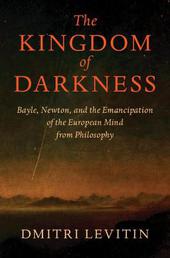
|
The Kingdom of Darkness: Bayle, Newton, and the Emancipation of the European Mind from Philosophy
Hardback
Main Details
| Title |
The Kingdom of Darkness: Bayle, Newton, and the Emancipation of the European Mind from Philosophy
|
| Authors and Contributors |
By (author) Dmitri Levitin
|
| Physical Properties |
| Format:Hardback | | Pages:980 | | Dimensions(mm): Height 236,Width 158 |
|
| Category/Genre | Philosophy of the mind |
|---|
| ISBN/Barcode |
9781108837002
|
| Classifications | Dewey:190.9032 |
|---|
| Audience | | Tertiary Education (US: College) | |
|---|
| Illustrations |
Worked examples or Exercises
|
|
Publishing Details |
| Publisher |
Cambridge University Press
|
| Imprint |
Cambridge University Press
|
| Publication Date |
31 March 2022 |
| Publication Country |
United Kingdom
|
Description
In 1500, speculative philosophy lay at the heart of European intellectual life; by 1700, its role was drastically diminished. The Kingdom of Darkness tells the story of this momentous transformation. Dmitri Levitin explores the structural factors behind this change: the emancipation of natural philosophy from metaphysics; theologians' growing preference for philology over philosophy; and a new conception of the limits of the human mind derived from historical and oriental scholarship, not least concerning China and Japan. In turn, he shows that the ideas of two of Europe's most famous thinkers, Pierre Bayle and Isaac Newton, were both the products of this transformation and catalysts for its success. Drawing on hundreds of sources in many languages, Levitin traces in unprecedented detail Bayle and Newton's conceptions of what Thomas Hobbes called The Kingdom of Darkness: a genealogical vision of how philosophy had corrupted the human mind. Both men sought to remedy this corruption, and their ideas helped lay the foundation for the system of knowledge that emerged in the eighteenth century.
Author Biography
Dmitri Levitin is a Research Fellow at All Souls College, Oxford. He works on the history of knowledge: philosophical, scientific, medical, and humanistic. He has previously held positions at Trinity College, Cambridge and at the Folger Shakespeare Library in Washington DC. His first book, Ancient Wisdom in the Age of the New Science (Cambridge, 2015) was a Times Literary Supplement Book of the Year. He writes regularly for the London Review of Books, Times Literary Supplement, and The Literary Review. In 2016, he was awarded the inaugural Leszek Kolakowski Prize for the world's leading early-career historian of ideas.
Reviews'This truly monumental study calls for a Copernican revolution in our understanding of Modernity: the European Mind, Levitin argues, was not transformed by the triumph of philosophy but by emancipation from it. The evidence and acumen with which Levitin advances his bold thesis are extraordinary and will provoke debate for years to come.' Maria Rosa Antognazza, King's College London 'In his extraordinarily erudite and broad-ranging study, Levitin compels us to rethink historiographic categories such as the Scientific Revolution, the Enlightenment and the rise of modernity in Europe by charting the contingent historical conditions that prompted a momentous, yet overlooked, disciplinary reconfiguration of early-modern natural philosophy and theology; namely, the emancipation of both scientific and religious thought from traditional metaphysics and philosophical rationalism.' Niccolo Guicciardini, Universita degli Studi di Milano
|